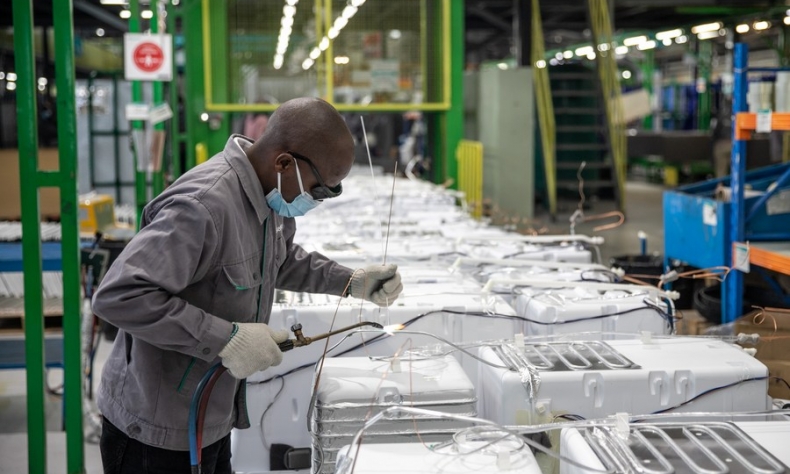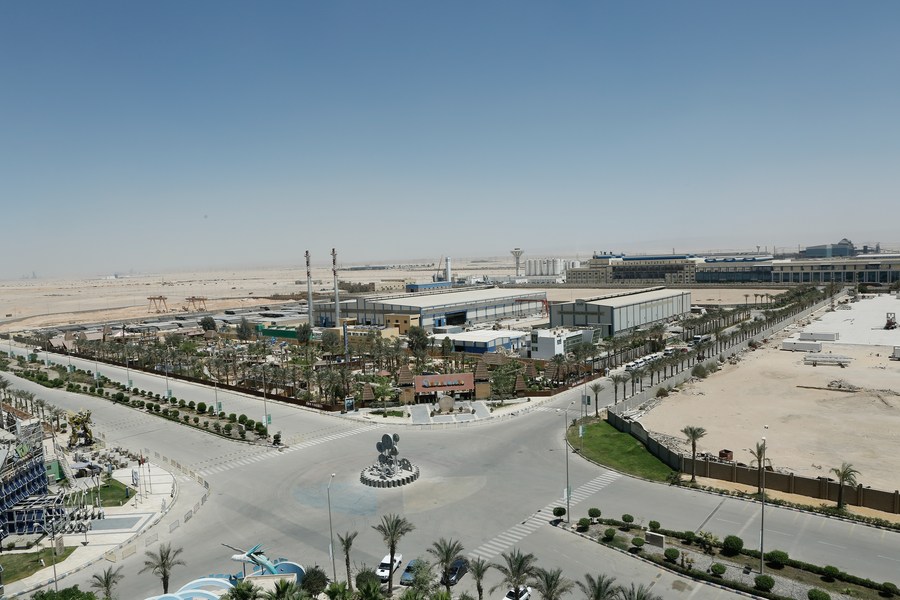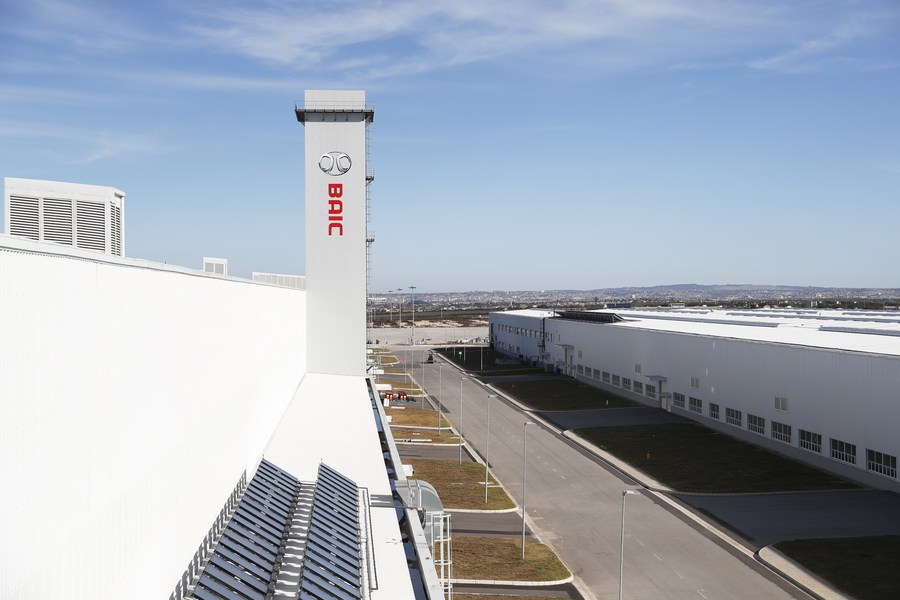Supporting Industrialisation Drive

China is expected to play a bigger role in Africa’s path to industrialisation.
As Africa pushes forward its industrialisation process, the Chinese-built industrial parks and free trade zones have assumed special significance as drivers of the region’s industrial development and job creation. At the same time, Africa is also learning from China’s successful experience in industrialisation.
What are the ways in which China and African countries can deepen industrial cooperation? What are the roadblocks to such cooperation and the process of industrialisation in Africa?
Officials, scholars and business representatives from China and Africa discussed these issues pertaining to Africa’s industrialisation on 19 December 2023 at a meeting in Beijing held to mark the 15th anniversary of the China Africa Industrial Forum (CAIF), an organisation facilitating China-Africa exchanges and cooperation in diverse fields.
The meeting agreed that although China-Africa economic and trade cooperation will face many challenges in 2024, it is still full of opportunities. In the future, both sides should grasp the new trend of industrial development to extend Africa’s local industrial chain and promote Africa’s industrialisation process.
Mapping industrialisation in Africa
Industrialisation is the prerequisite for Africa to achieve inclusive and sustainable development and the key to creating jobs, eradicating poverty and improving people’s living standards. Given the common interests and aspirations of China and African countries in pursuing industrial development, China has always supported Africa’s industrialisation and economic integration. The Belt and Road Initiative (BRI) identifies industrial capacity as an important area for mutually beneficial cooperation. In this vein, the Forum on China-Africa Cooperation (FOCAC) has always emphasised industrialisation and industrial cooperation in its action plans.

Given its natural resources and prospects for integrating its trade and industry into the global value chain, Africa has enormous potential for industrialisation. In the 21st century, the continent has laid a fresh layout for its industrialisation, and formulated the ambitious New Partnership for Africa’s Development in 2001, Action Plan for The Accelerated Industrial Development of Africa in 2007, and Agenda 2063 in 2015, aiming to promote a new wave of industrialisation.
However, as Tang Xiaoyang, dean of the International Relations Department at Tsinghua University, put it, the region needs to address a number of challenges, including a lack of economic diversification, limited basic infrastructure, and limited human resources capacity.
“China has found an effective path to industrialisation through its own exploration, and has a different understanding from Western countries,” Tang said. China holds an open and pragmatic attitude on how to achieve transformation goals in diverse and unique national conditions, and encourages African partners to independently explore their own paths, insisting that each country pursue its own development path, Tang noted.
Tang mentioned three key focuses of China’s industrial capacity cooperation with African countries: construction of industrial parks, synergy between infrastructure construction and industrial investment, and China’s investment in production that meets local needs. This approach is aligned with local development and generates sustained momentum for industrialisation.
Cheng Zhigang, secretary general of CAIF, predicts that China-Africa trade volume will further increase in 2024 to reach $300 billion. The new trend of establishment of overseas warehouses will usher in new opportunities. “More and more e-commerce platforms and export companies are planning overseas logistics systems by building overseas warehouses. In addition, China-Africa industrial parks will continue to develop steadily in 2024, reaching a peak in corporate presence,” Cheng told ChinAfrica.
In addition, in August 2023, Chinese President Xi Jinping announced that China will launch the Initiative on Supporting Africa’s Industrialisation, which will better harness its resources for cooperation with Africa, and encourage businesses to support Africa in growing its manufacturing sector and realising industrialisation and economic diversification. The initiative stresses that through the nine programmes under FOCAC, the BRI and the Global Development Initiative, China will channel more assistance, investment and financing towards programmes for industrialisation.

Challenges and opportunities
At the meeting, African Union Ambassador to China Rahamtalla Mohamed Osman said that the world is currently facing a series of challenges, such as disruptions in global supply chains, food and energy insecurity, etc. African countries are also suffering from inflation and debt troubles brought by crises. However, he believed Africa has huge potential for economic development.
Osman predicted that the economic growth rate of the African continent will reach 3.2 percent in 2024. The strong domestic demand in African countries not only is an important driving force for their economic growth, but also creates opportunities for Chinese companies to invest in Africa.
“I think China is ready to work with Africa to face all the challenges, and African countries will also open their doors wider to Chinese enterprises for cooperation and investment,” Osman told ChinAfrica.
Allan Chintedza, Malawian ambassador to China, said that as a landlocked country, Malawi’s vast territory means that transportation and logistics costs are very high. But with the orderly implementation of the BRI infrastructure projects, Malawi’s domestic transport costs will be further reduced and the business efficiency will continue to improve.
Chintedza stated that his country has been committed to promoting economic integration among member countries of the Common Market for Eastern and Southern Africa, thereby breaking down trade barriers between member countries and creating a more attractive investment environment for Chinese enterprises.
Mohammed Hassanali, economic counsellor at the embassy of Sudan in China, said, “It is not difficult to overcome obstacles and challenges in cooperation because China and African countries have the will and determination.” In an interview with ChinAfrica, he noted that during the China-Africa Leaders’ Dialogue held in August 2023 in South Africa, China unveiled the Initiative on Supporting Africa’s Industrialisation, stating that it would strengthen knowledge sharing and technology transfer with Africa, and optimise trade facilitation measures with Africa, which will create good opportunities for further improvement of China-Africa cooperation in industrialisation.
He Wenping, researcher at the Institute of West-Asian and African Studies of the Chinese Academy of Social Sciences, talked about three major bottlenecks in development facing Africa, namely outdated infrastructure, inadequate funding, and insufficient talent. However, as China-Africa cooperation continues to deepen, both sides are taking measures to actively address these difficulties.
“Economic development always brings opportunities and challenges. In the new era, China-Africa cooperation is the only way for both sides to achieve common development. It is beneficial for African countries to respond to the three major bottlenecks and improve their debt repayment ability,” she said.

Opening doors
Over the past decade, China-Africa economic and trade cooperation has yielded fruitful results. China has always maintained its status as Africa’s largest trading partner and has become Africa’s fourth-largest source of investment and an important infrastructure partner.
According to China’s Ministry of Commerce, there are currently more than 3,000 Chinese companies investing in Africa. As of the end of June 2023, the number of Chinese-funded industrial parks in Africa that were included in the Ministry of Commerce’s database reached 25, which collectively attracted more than 620 companies and total investment of $7.35 billion. The industrial parks had hired 42,000 local employees and paid a total amount of $1.48 billion in local taxes. In the process of investing in Africa, Chinese companies have contributed to Africa’s industrialisation and improvement of people’s livelihood, and have become one of the driving forces for inclusive economic development in Africa.
In fact, African countries are trying to attract more Chinese investors to support their industrialisation drive.
Gabonese Ambassador to China Baudelaire Ndong Ella said at the meeting that although the country is rich in natural resources, the development of its agricultural and sideline products processing industry lags behind. “China and Gabon have a profound traditional friendship. Gabon encourages local companies to actively strengthen cooperation with Chinese companies,” he said. The country offers tax incentives for foreign companies investing in industry, mining, agriculture and forestry, hoping to attract more Chinese companies to invest in Gabon.
Ahmed Zaki, minister plenipotentiary of the Egyptian embassy in China, said that the Egyptian government has implemented an ambitious economic reform programme which includes the 2030 economic development strategy aimed at high GDP growth. To encourage foreign investors, the country will adopt sound economic policies aimed at attracting more foreign investment and will provide a package of incentives and more investment guarantees, he said.
Last year, the China-Egypt TEDA Suez Economic and Trade Cooperation Zone (TEDA Zone) celebrated its 15th anniversary as it unveiled its 2030 Vision-Strategic Upgrade Plan. Under the joint efforts of the two countries, the TEDA Zone is labelled as a model project of the Suez Canal Economic Zone and all of Egypt.
“As of June 2023, 150 Chinese companies have established investment projects in the TEDA Zone, with a total investment of more than $1.65 billion,” Zaki said. He said the TEDA Zone is currently the industrial park in Egypt with the best overall business environment. It hosts the largest concentration of Chinese-funded enterprises.
In recent years, with its appearance at the China International Import Expo and the China-Africa Economic and Trade Expo, Rwanda’s specialty products such as coffee, tea, chili, and honey have won the favour of more and more Chinese consumers. “The Rwandan government is actively promoting more high-quality products to enter the Chinese market. Rwanda attaches great importance to all-round economic and trade cooperation with China, especially in the field of digital trade. I believe that in the future, Rwandan enterprises will establish connections with more Chinese partners and open up a new situation in trade,” Samuel Abikunda, commercial counsellor of Rwandan embassy in China, told ChinAfrica.
 Facebook
Facebook
 Twitter
Twitter
 Linkedin
Linkedin
 Google +
Google +










